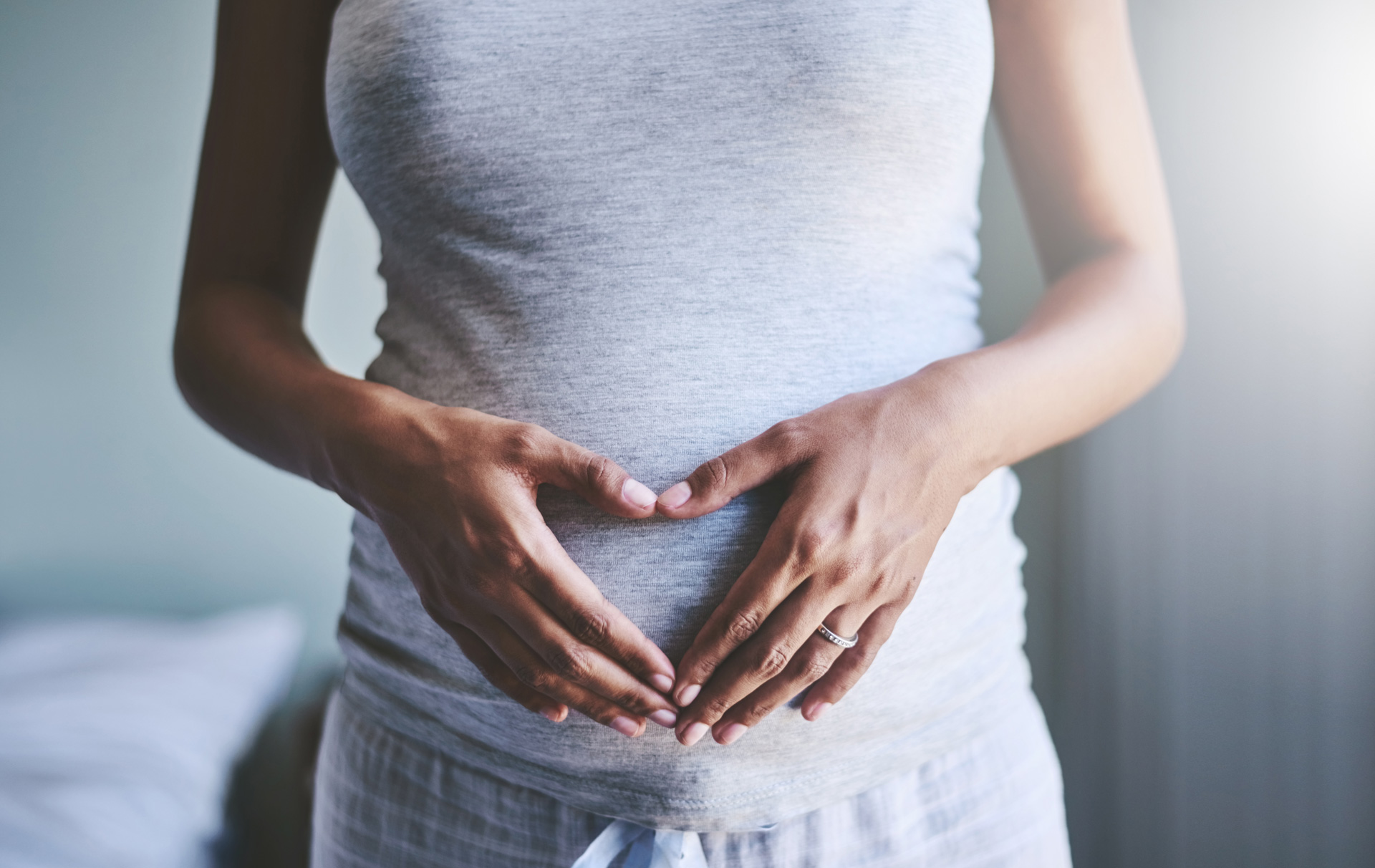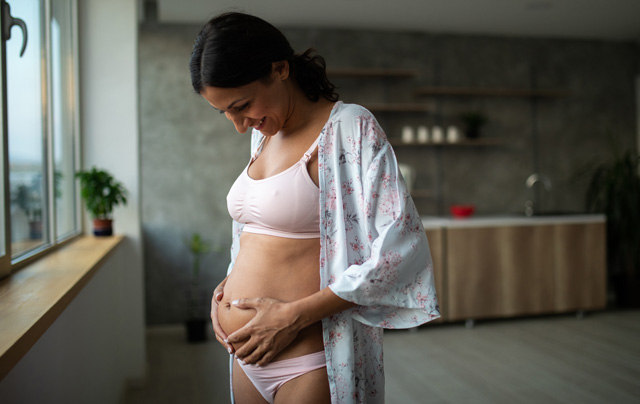Baby movement in pregnancy: When do you start feeling your baby move?
Baby movement in pregnancy is natural and exciting. Here, we explain what the first baby movements in pregnancy feel like and when to expect it.


Parenting advice, hot topics, best buys and family finance tips delivered straight to your inbox.
You are now subscribed
Your newsletter sign-up was successful
Baby movement in pregnancy is natural and exciting. Here, three pregnancy experts give the lowdown on baby movement in pregnancy, such as what a baby kicking feels like, what kick counting and quickening mean, and whether to expect increased baby movement before labour.
Pregnancy is a time of great joy but also apprehension. Your body changes and you may develop unusual food cravings. Feeling your baby move can feel strange at first but it helps you – and your partner – connect with your unborn child. Here's what to expect from baby movement in pregnancy and when you'll start feeling your baby move.
Can you feel baby movement in pregnancy at 12 weeks? When should you start feeling your baby move?
It’s very rare but some women report feeling their baby move as early as 12 weeks – it’s hard to tell the difference between movement and wind but Marie Louise, aka The Modern Midwife, says she believes it’s possible even at this early stage.
"Many things affect what you feel and when you feel baby movement in pregnancy," says Marie Louise who is also the author of The Modern Midwife's Guide to Pregnancy, Birth & Beyond. "These include whether or not you’ve had a baby before, your BMI, the position of the placenta, and so on."
"Generally, pregnant women will start to feel their baby move between 16-24 weeks," says Vicky Perkins, NHS Midwife, Hypnobirthing Instructor and Founder of The Group in South London, which runs antenatal and hypnobirthing classes.
"The gestation at which women and pregnant people start to feel the first movements is dependent on whether they've had a baby before or not. For example, if it's their first baby, it can be common to start feeling the baby wriggling nearer 24 weeks," she says.
It's not necessarily a cause for alarm but speak to a health professional if you haven't felt your baby move by the middle of the second trimester. "If you haven't felt your baby move by 24 weeks tell your midwife – they'll check your baby's wellbeing," says Lia Brigante, Quality & Standards Advisor at the Royal College of Midwives.
Parenting advice, hot topics, best buys and family finance tips delivered straight to your inbox.
What do first baby movements in pregnancy feel like?
"Every woman will feel her baby’s movements differently – even between pregnancies – as every baby is different," says Lia. "The movements have been described as a swirling, a kick, a flutter, a swish or sometimes a roll. Your baby’s movements may also change as they grow and as your pregnancy progresses."
"There's no set number of normal movements once they start; they tend to increase until 32 weeks of pregnancy and then stay about the same through labour and birth," she explains.
"Some women report them feeling like butterflies in their stomach, bubbling, or even gas," Vicky adds. The position you're in can affect whether you'll feel baby movement, too: "Sometimes, women may feel the movements more obviously when they are lying down on their back or sitting."
What is quickening and what does it feel like?
"Quickening is when you first start to feel your baby moving around," says Lia. "It may feel like a delicate fluttering or swirling – some women describe it as air bubbles."
"These little flutters are the first baby movements women feel," adds Marie Louise. "Feeling fetal movement is reassuring. It's a sign that the baby is well and getting lots of oxygen and nutrients. While we tend to refer to all movement as ‘kicks' they can be elbows or bottoms depending on the position of the baby!"

When will baby kicking start and what is kick counting?
"Counting the kicks was a campaign started by some bereaved mothers in the early 2000s. They wanted to raise awareness of the importance of monitoring baby’s movements in the third trimester," explains Vicky.
"A baby’s movement is the first indicator of how happy they are. If a baby is under any stress, the first thing they'll do is to slow their movement and conserve their energy.
"However, NHS guidance has moved away from expecting a certain number of kicks per day. We know each child is an individual – some are very active and some less so," midwife Vicky continues.
"The important message is for expectant women to be mindful of how much their baby moves, especially from 28 weeks onwards. Women should start getting to know their baby, and trust their maternal instincts. If a mother-to-be is concerned that their baby is a little 'quieter' than normal, they should always phone their midwife or hospital to get advice."
"We shouldn’t be counting kicks anymore as it doesn't provide an accurate reflection of fetal wellbeing," adds Marie Louise. "It’s more about noticing a pattern (if mum is able to) and keeping an eye on that. So, is the baby more active in the morning or evening, or perhaps after a cold drink? You then start to know what's normal for your baby and are able to report changes," she says.
When will my partner feel the baby kick?
"It varies from person to person when the partner will be able to feel the baby’s kicks," says Vicky. "Often it can be a couple of weeks after the mother starts to feel the baby move.
"Sometimes, couples may be able to see the baby kicking and wobbling their mothers’ belly before they feel it externally. By the third trimester it's likely that partners will be able to feel their baby’s movements when placing a hand on the mum-to-be’s lower abdomen."
Will there be increased baby movement before labour?
Midwfie Marie Louise says there won't necessarily be increased baby movement before labour: "To my knowledge there’s no research to support that babies move more pre-labour. There’s a myth that babies move less, though. The type of movement maybe different as there’s less room pre-labour but the frequency and pattern shouldn't change," she says.
"You could still be feeling your baby kicking whilst in labour," says Lia. "Babies should move in the same pattern throughout pregnancy and during labour and birth."
A last word of advice: "It's important you don't rely on home doppler machines or phone apps to check on your baby’s heartbeat," she adds. "There's no evidence that they are effective. Even if you think you can hear a heartbeat, it doesn't necessarily mean your baby is well. Don't hesitate to get in touch with your midwife if you're unsure about baby movements. There are midwives providing 24/7 cover in all maternity units and they're always happy to help."

Debra Waters is an experienced online editor and parenting writer. She also has a strong background on health, wellbeing, beauty, and food. She currently writes for Goodto and Woman&Home, and print publications Woman, Woman’s Own, and Woman’s Weekly. Debra has written for What to Expect, Everyday Health, and Time Out. In addition, she has had articles published in The Telegraph and The Big Issue.